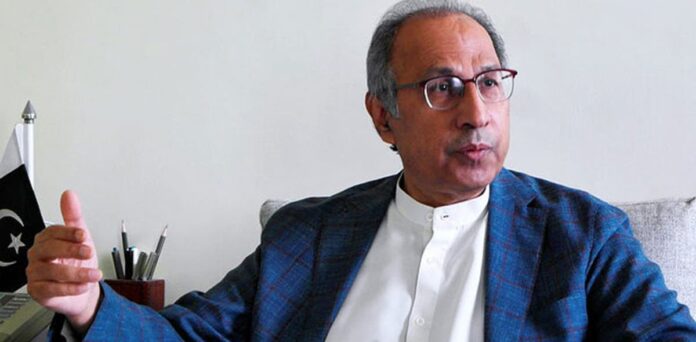ISLAMABAD: Finance and Revenue Minister Dr Abdul Hafeez Shaikh has said the incumbent government would further curtail its expenditures to pass on relief to the common man.
Talking to a private news channel, the finance minister said that the government has already taken austerity measures to control the fiscal deficit, adding that macroeconomic indicators are now showing signs of growth, which means “the country’s economy is on an upward trajectory”.
He attributed the positivity [in indicators] to prudent policies and initiatives taken by the government under the leadership of Prime Minister Imran Khan.
He noted that the previous government of Pakistan Muslim League-Nawaz (PML-N) had left the economy in a weak position by taking huge foreign loans. “The incumbent government has been focusing on improving the real sector growth through the promotion of agriculture, industry, and services sectors of the economy.”
Realising the importance of sub-sectors of the economy, he said the government had initiated different programmes, including National Agriculture Emergency Programme (NAEP), under which 13 mega projects worth Rs277 billion are currently in the execution phase. “The objective of NAEP is to bring about improvements in water availability, soil conservation, shrimp fanning, and establishment of new agriculture markets.”
The minister said that the Rs10.964 billion megaproject namely National Oilseed Enhancement Programme (NOEP) under NAEP was launched to boost the adoption of oilseed crops at a cost of Rs10.964 billion for five years. Likewise, the government allocated Rs10 billion for locust control in the current budget while an amount of Rs12 billion was allocated under Public Sector Development Programme 2020-21 to ensure food security and promote the agriculture sector.
He said that the government enhanced agriculture credit disbursement by 3.5pc during the fiscal year 2020 to Rs1,214.7 billion as compared to the corresponding period of last year while during the first three months of the financial year 2020-21, agriculture credit disbursement stood at Rs250 billion.
Meanwhile, to support the industrial sector, the government has taken many initiatives including reduction of Federal Excise Duty (FED) on cement from Rs2 per kilogramme to Rs1.5 per kg, relaxation of excise duties on textile items, Rs33 billion markup subsidy for the construction sector, Export Finance Scheme (EFS) maintained at 3pc, while Long Term Finance Facility (KTFF) was reduced from 6pc to 5pc.
Moreover, the State Bank of Pakistan had announced additional support of Rs190 billion for exporters and investors, he added.
The minister opined that the government’s measures in agriculture, industries, and external sectors along with controlling inflationary pressures would not only stimulate economic growth but would also provide significant support in reducing poverty.























